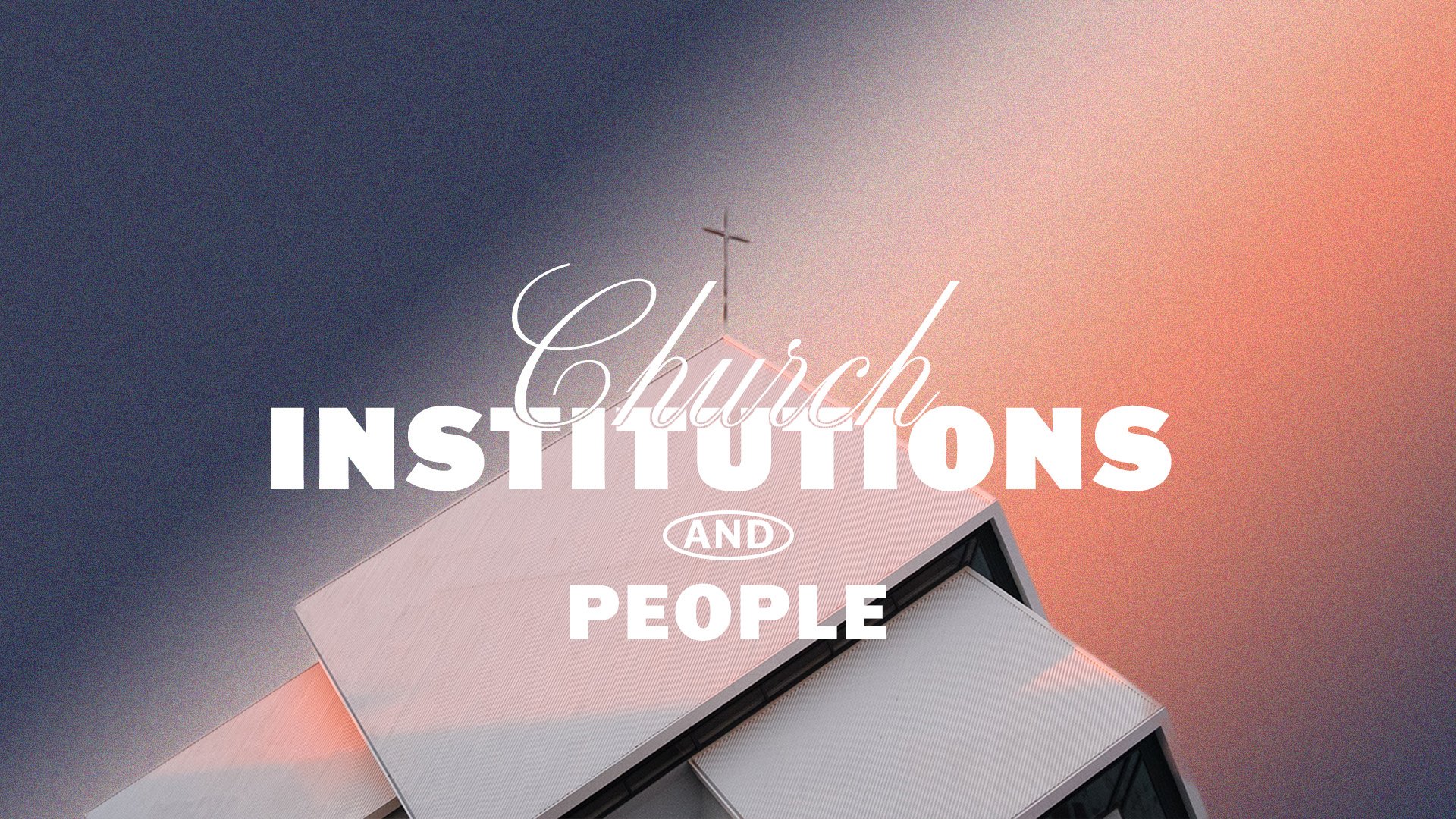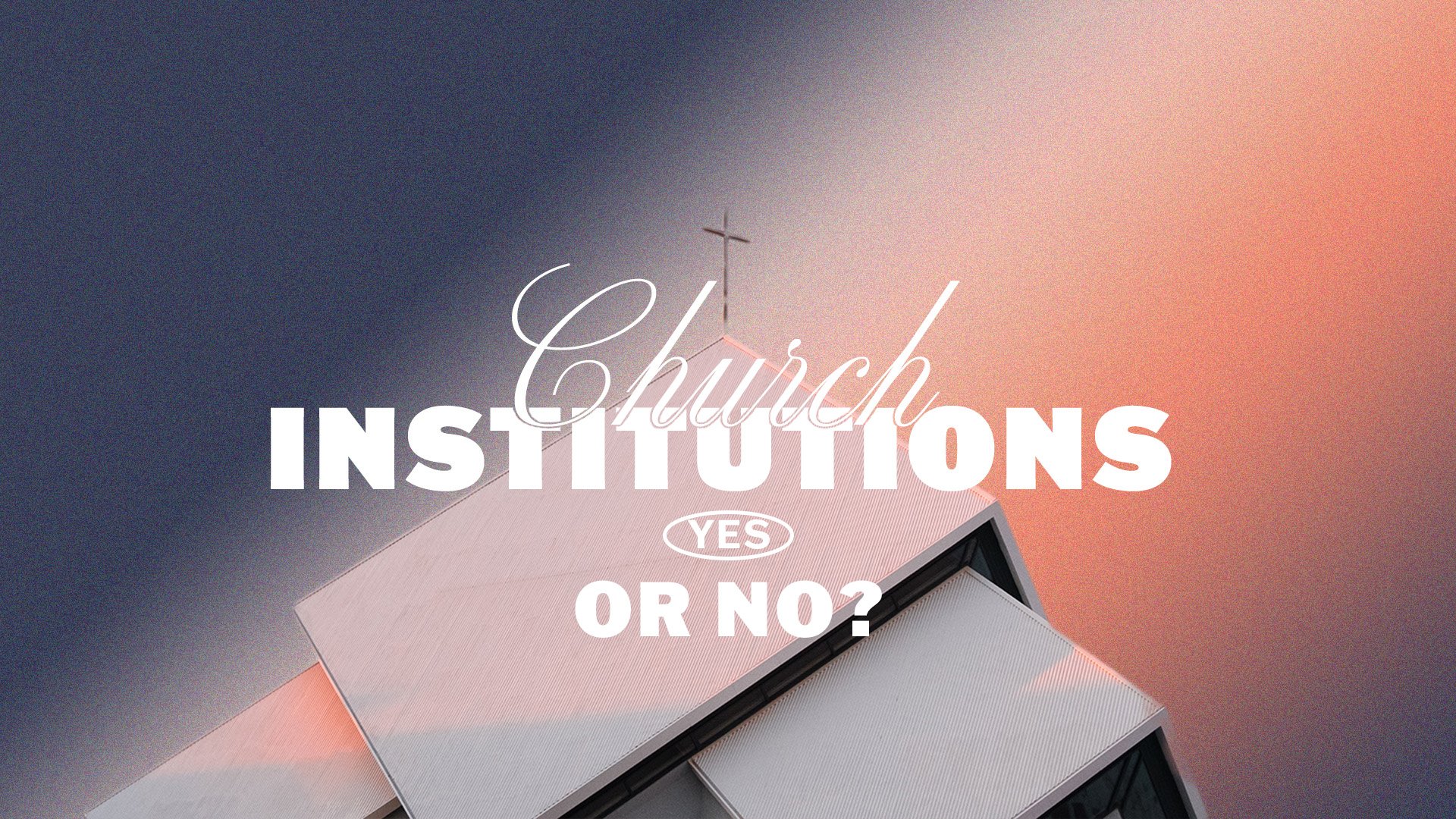
I like to share my thoughts on theological and philosophical topics. I am also a student working through an MDiv and occasionally share papers on the blog. If you have any questions on a paper or blog post, send me a message! I’d love to talk with you about it.
Is Church an Institution? Or People?
You, by yourself, are not the Church. You cannot be. In fact, if you manage to get a few other people who band together with you, and you all happen to be christians, you’re still not the Church. And here’s why…
The Church is God’s dynamic organism on earth, fulfilling His mission to spread His Kingdom of salvation and righteousness across the entire world. You are either working with other Christians to make that mission a reality, or you are sitting around complaining at how others are doing it wrong.
It’s something I heard all the time, “We are the Church! It’s not a building! We are the Church!”
Are you though?
I started to notice a growing tendency with a few people in my church concerning what Church actually is. They’d say things like, “WE are the church. It isn’t an institution.”
Unless there was some sort of social or political crises in our neighborhood. Then the same group of people would call me and ask, “So what are you going to do about it? You’re a church, after all. You should be doing something.”
Wait a minute. This isn’t adding up. When it’s convenient or advantageous, the argument was, “Church is people, it isn’t an institution. Stop making it all about the institution!” and when a person did not want to be bothered, the argument became, “What is your church as an institution doing about this? This is what you get paid for, right? You need to do something.” Whenever a Black Lives Matter protest broke out, or when a natural disaster hit nearby, or when there was some scandal in the nearest high school with some dangerous trends spreading among students, people would ask me, “Well as a church what are you doing about it?”
I remember sitting down in the lobby one winter with a fellow church member and having a candid conversation about how we could help several families who had lost their homes to a major fire. Plans were put together to purchase winter clothing and have groceries brought to the families thanks to mutual help from members of our church. This woman had told me on multiple occasions that church is about people, not the institution, and that we should spend less time focusing on the institution of the church. As we discussed the needs of these families suffering loss, she looked at me and said, “This isn’t enough. There’s still more of a need here. You’re a church. You are who people go to when they need help. What kind of church is this if it cannot meet the needs of others?” I sarcastically looked at her, (and I’m not proud of this) and said, “I thought you were the church? What are you doing about it?”
Though I wish I had been less crass in my response, my feelings towards the situation are the same: We cannot complain that churches focus too much on their institutions instead of people when we have something to complain about, but blame church institutions when we don’t want to carry responsibilities ourselves. That’s a dangerous game that only compounds issues. So is the Church a group of people? Or is it an institution? Well, first let’s ask this: How does the bible consider the Church? How did people in the first few centuries view Church?
Both the Book of Acts and early church fathers show us that the very first church was, in fact, an institution just as much as it was a group of people. The first major controversy regarding church behavior came down to the decision of a select group of people in the Jerusalem church. Many gentiles (people who did not practice Jewish dietary or sabbath laws, and who often participated in pagan rituals of worship and food preparation) were becoming followers of Christ, which begged many to wonder how gentiles should behave. Almost none of them were circumcised. Do they need to be? How difficult should we make it for gentiles to join the fellowship of the church? Though dozens of smaller churches had sprung up by this point, there was a central place of authority that was tasked to prayerfully decide how this issue should be handled, and that central place was the church in Jerusalem. According to church tradition (and also implied in the Book of Acts) The Jerusalem church was led by the Apostle James. Though there are thousands upon thousands of christians across half of the Roman Empire at this point, the most influential christians who carried the largest spiritual load of the people and who worked most laboriously to spread the gospel were entrusted to make the decision for every single other christian. That means that an institutional framework was applied to the church to delegate practical and spiritual matters, and there was a clear delineation of authority among christians. This pattern continued for centuries, though the location changed from Jerusalem to Antioch or Alexandria, where major Christian churches were established as well. There was always a central institution that represented the whole of the group and help oversee and source everyone else to some degree.
At the same time, no one can deny that the church only exists because individual christians make it so. The apostle Paul remarks several times (1 Cor 12:12; 27; Rom. 12:4-5; Eph. 2:19-22; 4:4; 15-16; 5:29-30; Col. 1:24; and more) how each believing Christian is like one brick, mortared into the structure that makes up Christ’s body on earth, the Church. We all have a role to play, and we all make the structure function, so of course the church is not only an institution: It is and institution comprised of God’s people on earth. But too often I hear people say things like, “Well, that building isn’t the Church, I am the Church!”
No. No you’re not.
You, by yourself, are not the Church. You cannot be. In fact, if you manage to get a few other people who band together with you, and you all happen to be christians, you’re still not the Church. And here’s why…
The Church is God’s dynamic organism on earth, fulfilling His mission to spread His Kingdom of salvation and righteousness across the entire world. You are either working with other Christians to make that mission a reality, or you are sitting around complaining at how others are doing it wrong. If you’re working with other christians, churches, institutions and operations that are living to fulfill this mission, and you have regular participation, accountability, fellowship, and exhortation with these groups, then you are, in fact, participating in the church. If you’re sitting just outside the walls complaining that everyone does it wrong, are making excuses as to why churches don’t deserve you, and you are choosing to work for God all by yourself, you are not part of the church, because that’s not how it works. There is a mutual submission to each other, especially to people you don’t like, or people you disagree with, that comes into play when functioning as the Church. As both a people and an institution, we are supposed to struggle to find unity with each other until our personal preferences and preconceived biases are sitting up there on the cross with Jesus’s death, letting go of petty grievances and working together in mutual grace and mercy.
Now over the last century, especially in America, there has been a large shift in how some churches function, and perhaps this is where some of the “corporate church” criticism comes from. As businesses and non-profits made their entire mission about raising money and building success, that mindset easily seeped into the minds of ministers too. The mission may have become cloudy concerning spreading God’s kingdom and instead focused on raising funds, getting every penny from tax exemptions and taking advantage of grants and property opportunities. Yes, at times in American history church institutions have appeared to sell out for the sake of worldly success markers rather than kingdom ones. But it is extreme to become anti institution over the failures of some churches throughout the years. The answer to a problem is not to fling too far in the other direction. That’s never the answer. Being anti institution is not being pro Church, because at the end of the day, the Church is still an institution just as much as it is a collective of Jesus followers.
Sometimes it’s easier to criticize a faceless institution than it is to criticize a person. That’s where the temptation comes in. People might think, “Well Joey’s a nice guy. He’s doing his best. It’s just his church that’s the issue.”
Honestly? Just tell me that you have a problem with something I’m doing. Be honest. I can handle it. I’m supposed to handle it. Don’t blame the faceless institution. Talk to me.
This happens with many generic complaints: “That church is really judgy,” or “that church is so legalistic,” and “the teaching in that church is just not enough for me.” Well, who at that church is judging everyone? Who is legalistic? Who’s teaching is sub par? Is it really every single person in that church? Of course not. But it’s hard to have those tough conversations, so we just criticize the entire institution instead. But if the church is made up of people, then we need to work through our issues with these people. Rather than blindly blaming “that church” or the “institution” of church, be honest and air that grievance with the person on the other end of it.
Now if you are a person who operates alone not because you are anti church-institutions, but because the church has hurt you, kicked you out or snuffed out your ministry, I’m sorry. That’s truly difficult to experience, whether called for or not. Sometimes in the friction of disagreement, a mutual conclusion can’t be reached, and there are church leaders who would rather send a person away than find a different solution. Sometimes the church leader has no other solution and it really is best for a particular person to stop being involved in ministry. Sometimes lay people or pastors give in to fear and just avoid dealing with the long process of healing that is needed. But that doesn’t make these decisions less painful. We’re all stupid humans, and we hurt each other sometimes. If you’re on the fringes of the church institution because you’ve been hurt, I encourage you to seek restoration and healing rather than giving up on institutions. Maybe not in the same church, but somewhere you can make a clean start, because God still sees people who need you in the local church, and there are people in the local church that you need. Really, you guys need each other.
Since moving into an RV and traveling full-time with my family, church has looked extremely different to me. I’ve spent more time around campfires and in front of coffee mugs (I’m pretty much always drinking coffee) having church in small settings. And I love that. I think America needs more of that. But there will always be a need for larger church institutions. Every community needs an institution, as well as small gatherings and home churches, because among that united church ecosystem the Kingdom of God will spread, and people will be loved. I still watch my home church online and participate with them, and I thank God for that. Without their institution, I wouldn’t have that resource. Is the Church an institution, or is it the people?
Yep.

